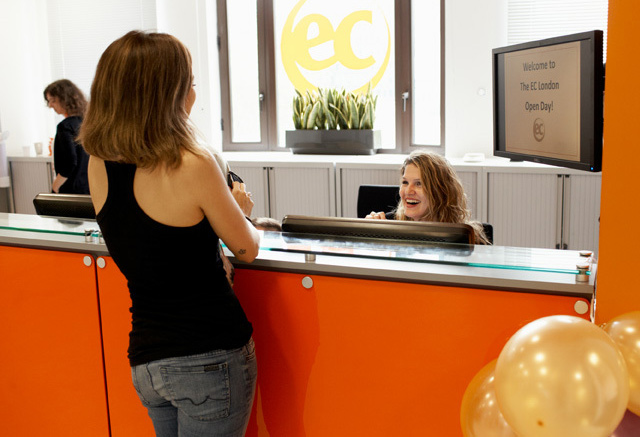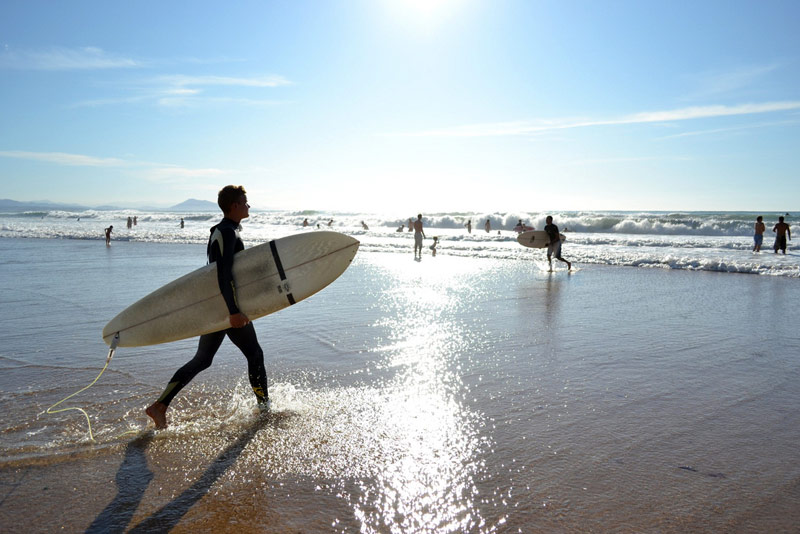Sustainable development is at the heart of our business here at ESL. A major step we have taken has been the introduction of a CSR (Corporate Social Responsibility) self-assessment tool for language schools – the first of its kind in the study abroad industry.
The online tool allows schools to accurately assess their progress with CSR, alongside any potential areas for improvement. We then encourage partners to share their experience with each other.
Dan Woodard from EC English has been using the tool and we were very interested to find out more about his experience.
ESL: Can you tell us a little about your role at EC?
Dan: I come from an academic background; I started off as a teacher and was teaching for around 10 years and then moved into a managerial position but still within the academic team. I studied environmental policy so I have a background in the environmental side of things and I knew that EC were looking to develop their own CSR strategy. I got chatting with Mike Xuereb, our CEO, about the prospect of putting a concrete strategy in place and so I went from doing academic management to a part-time role as CSR coordinator for the company. Then as the CSR program started to snowball I eventually left my academic side behind and moved fully into a CSR role – my current job is CSR executive. My working day sees me dealing with a range of CSR initiatives touching on environmental and social issues, (which can be across the group or with individual centres), as well as dealing with staff engagement.
How has EC’s approach to CSR developed in the time that you have been there?
Our primary focus is to help students succeed in a global community and I think that’s what has driven our CSR; this idea that we can help in some small way to drive a global shift towards sound environmental and global practice by setting a good example to our students. It has also been driven in a very large way by our staff, teachers and administrative staff alike who have shown a great amount of passion in wanting to give back, whether on an environmental front or a social front, whether in a local community or globally. There’s this real passion to want to do something good. I think the combination of recognition of the passion of our staff and that we are in a privileged position to help set an example to students from all over the world is what primarily drove the steps towards CSR.
In the early days, it was done on a fairly ad-hoc basis from our head office. I think what really started to drive it forward was the ESL CSR tool, which started to give it structure, and was a very good starting point at which to lay our cards on the table and say “we have a framework to build upon”. That’s really when my involvement first came about. In 2011, after discussions with our CEO, we looked at the ESL tool and realised that it could help inform our entire strategy. The first steps were to appoint me as a CSR coordinator, and then appoint a CSR Champion in each of our centres; someone who would take on the responsibility of CSR in our centres… not a job in its own right but rather an additional responsibility for an existing member of staff.
Does responsibility for sharing information come from the CSR Champions or does it go through a centralised process?
A little bit of both. We have a CSR group on Yammer; all of our champions are on that group and we try to share everything. If they did a fundraiser last week, they can post some photos and show us what they did. If they come up with a good idea, they can let us know about it. If they are seeking advice on something, they can communicate it with the rest of the CSR Champions. We want to avoid the top-down approach to CSR as much as possible. For some aspects it is necessary, for example the group strategy and CSR charter (which has been developed in conjunction with things like the ESL tool) comes from the top down, by necessity.
When it comes to actual implementation of CSR ideas, as much as possible we want that to come from grass roots. We want the schools, the staff and the students to come up with ideas that work for them in their centre , as obviously every centre is different. They have different needs, legislation, climate – all of these contribute to make a different animal. Having a centre that comes up with its own, unique way of implementing CSR is, for us, the best way to do it because it means that they have buy in; they are going to believe in it. If it all comes top down, they are not going to buy into it so much. The best case scenario is where we have centres that say “look, we have come up with this great idea” and they share it with the rest of us and then the rest of us say “that’s a really good idea, let’s all do it.” A good example of that is our school in San Francisco, who told us about an idea where they had a change jar in their reception – a very simple idea – that invited students on their final day to donate any leftover currency. So they have a handful of dollars which they no longer need, it goes in the change jar and then, at the end of each quarter or each year, that change will then be donated to a charity voted by the staff. It’s such a simple idea but so effective. That’s something that we immediately rolled out to all of our centres.
That’s certainly a benefit of being a larger group of schools, but are there any challenges that come with being a group?
Definitely. One of the things that can make it difficult is being an international organisation with centres in locations around the world. That brings about its own set of positives and negatives. The positives are obviously that we get input from a variety of different cultures and a variety of different viewpoints, and we can begin to spread the message of CSR much more widely.
The negatives include dealing with a team remotely – it’s difficult to go and see each individual centre and find out what is happening on the ground so I am relying on input online. Also, different countries have very different circumstances. Sometimes there is great variation in legislation, sometimes in climate. For example, a school like EC Cape Town has a whole range of charitable organisations on its doorstep that are crying out for help. They work with a local primary school, providing free English lessons, they work with a local orphanage – and these things are everywhere. There is a plethora of opportunities to help. Compare that to London where CSR is already big business and you send out communications to various charitable organisations in London saying “here we are, we are offering our help” and it’s much more bureaucratic, there are criminal checks, health and safety… suddenly you find out it’s almost impossible to do because of the amount of paperwork involved, so just finding those opportunities can be more tricky. And that’s just on the social side. If you look on the environmental side, some cities are very forward thinking. Our school in San Francisco is LEED Gold Certified, and that’s an example of how forward thinking the city is. They seek to be the role model for the rest of America’s cities. By comparison, the small island of Malta may not have developed the infrastructure for such environmental initiatives.
I think another difficulty has been the perception of CSR; it can be quite a touchy subject. Some people have a very positive view of CSR, they see it as an opportunity to do the right thing – to give something back – and they embrace it. Other people can be more sceptical – they see CSR as a marketing tool or gimmick. Staff and customers have sometimes questioned our motivations to give back. We’re not naive; we realise that the financial aspect can’t be ignored. For CSR to work, you have to strike a balance between environmental, social and financial concerns, otherwise it is simply not sustainable. But I think CSR from EC is sincere and we do continually try and communicate that. CSR is not just embraced on the front line but all the way to the top. For example Mike, our CEO, has pledged to go carbon neutral this year and he has done it so far! He has restricted himself to one ream of A4 paper. It is sincere but it is an ongoing challenge!
Have you received much government support in the different countries?
I think the support has tended to come from not-for-profit rather than the public sector. In Brighton, for example, there is an organisation called Skills Exchange that puts companies in contact with not-for-profits to provide skills. For example, you might have a charity in Brighton that desperately needs help with their marketing, so the organisation will say “this company can help with marketing” and match them up and there you go, job done! Part of what we have been doing is to try and build better relations within the community and a large part of that is developing relationships with not-for-profits.
In London we have been working very closely with a community centre based in St Pancras that has a large number of members from the local community including many non-native English speakers. We have developed a project which provides free English lessons to help members of the community to integrate. So I think, when it comes to local support, it depends on the location, but there is often so much bureaucracy involved with Western governments that we tend to have more joy with the not-for-profits.
Do you have some concrete examples of what has been taking place within the group?
I think a very good example has been what we have managed to achieve with the ESL tool. Along with the passion from our staff, the ESL tool was one of the first things to actually help us provide a bit of structure: we used the sustainable development, education and community aspects of the tool to inform the three pillars of our CSR charter. When we first completed the tool in 2011, for the majority of our schools, the average score was around 2 out of 10, so quite low. We kept building on that, then we carried out a review a couple of months ago and in 18 months we had made an average 40% improvement, so we are getting scores around 6/10. So that’s real concrete evidence of what we have achieved.
We developed the charter which is now in place across all of our centres and available for staff and students. Also we now have a much more in-depth strategy in place. We invested in CSR training for our staff, including online training videos touching on CSR-related topics such as carbon neutrality, recycling, etc. We developed a suite of policies, including an environment policy, an energy efficiency policy and a fundraising policy. In the past 12 months we have raised in excess of €10,000 for a range of causes including Hurricane Sandy, for which we raised more than €3,000. We got involved in Movember and managed to convince many of our (male!) staff members to grow a moustache last November and we raised €2,700 from that. Many of the initiatives are local ones supporting local charities, some of them we encourage people to get involved at a much larger group level.
We have comprehensive recycling at all of our centres and have implemented a volunteer day policy across the schools, which means that EC staff can take a paid day off to go and volunteer for an organisation of their choosing. That has been very well received. We have also introduced a sabbatical policy, so if there is a member of staff who wants to do something longer term, like teaching English in Africa for three months, then we can provide them that time off and hold their position for them.
Another big environmental step has been towards becoming carbon neutral. The first thing we did was to get involved with a partner organisation, confusingly called Carbon Footprint! They are a UK-based firm that asks for a dataset including energy consumption figures, travel figures, information about air conditioning and so on, so we had to collate that for each of our centres for 12 months, send it through to Carbon Footprint and they said, “ok, for this year your carbon footprint is x tonnes.” Our goal is then to reduce that and once we have done that we can look at offsetting the remainder, to become carbon neutral.
We have long-term business students and we have included CSR all the way through our business syllabi. We have introduced an elective class called “Global Citizenship” which focuses purely on topics related to CSR, including climate change, equality, poverty, etc, which is proving very popular. We have 17 centres and at present 7 of those centres are getting involved in local communities as a long-term commitment to providing English lessons or skills-based lessons to refugees and immigrants; that’s going really well and eventually we want to roll it out to all of our centres. At the moment the lessons are provided by our staff but eventually we want to get our students involved as well, so the students have a chance to learn about the real-life issues that are affecting people. Not only are they learning the language but they can get out into the community and engage fully, thereby providing a very holistic learning experience.
How are the students responding?
It varies massively according to a range of factors including age, how long they are spending at EC, and culture. You may get an 18 year old student from Europe who has come for a couple of weeks to brush up their English but also have a holiday – volunteering may not appeal to them. Another student that is booked on an academic year course, who perhaps has an interest in CSR anyway and would view it as good experience for their CV, they could be very interested. I’m quite optimistic about the response we will get, based on the response we have had from our global citizenship elective where students have engaged with the topics. I think there is potential for them to get very engaged with dealing with this in a real life situation as well.
It’s also a fantastic way to improve your English…
Absolutely. They are in the microcosm of the classroom where everything is nice and safe, which is the perfect environment for them to practise, to make mistakes with the teacher on hand to correct them and to build their confidence. Once they have the vocabulary related to the subject matter, once they have practised the discussions and the debates and the questions and the answers, we can then say “ok, let’s now put you in the real life situation, let’s take you out of the safe environment of the classroom and let’s throw you into the lion’s den, so to speak” and they are in a situation where they are confident to get out there and do it.
One of the things we are always told is that “when I come to the classroom, I understand my teachers, I understand my classmates, but as soon as I go out into the big, wide world, it all goes wrong!” so being able to support our students in that step from the safety of the classroom environment to taking them out into the community really ties in nicely with our CSR programme.
Apart from the ESL CSR tool, what other metrics do you use to measure success in your CSR programme?
CSR can be a very difficult thing to measure and traditionally that has been something that has acted as a barrier to successful implementation. What does CSR bring to a company? Things like staff engagement and retention, feel-good attitudes… how do you measure that? So, we tend to measure as much as possible on things like the ESL tool.
Another thing we are looking at is the Best Companies accreditation. We carried out our first Best Companies survey last year and we will be doing it again this year. There are eight criteria for best companies, ranging from company leadership and management to “giving back” and what we are aiming for in 2013 is to get one star for “giving back”. In the longer term we will be aiming at three stars.
We carried out a survey to get a pulse of our staff’s interpretation of how CSR is going across and we will be doing the same for students later in the year. Also we are getting feedback on a much more local level, such as focus groups – sitting down with people and getting their face-to-face feedback as much as possible.
The Carbon Footprint assessment also gives us figures that let us know how we are doing on an environmental front.
What’s next up on the agenda?
For 2013/14 we will be looking at our Carbon Footprint. After liaising with our partner organisation they said that we should set a target of 1%, which we initially thought sounded quite low but their take was that it is relatively easy to achieve and will help to drive motivation, get people onboard and 1% will then become 2% or 3% in the next year.
We are also looking to fully embed CSR in our student experience. As I mentioned before, that will involve getting students involved in community volunteering. On that front, we are working with Group Academic to write new syllabi and to come up with new materials to incorporate into our academic programme. All of our different locations will eventually have a relationship with a local community organisation.
We have already come a long way but would like to improve our scores on the ESL tool from a current average of 6/10 to 7/10 across all of our locations. Also, we want to achieve that one star in “giving back” on the Best Companies accreditation.
Looking at the next 5 years, we want to be able to say we are the world’s first fully carbon-neutral language school. We want to be looking at scores of 9 or 10 on the ESL tool. We will be looking for the full three stars on our Best Companies accreditation for “giving back”. These are all things that we are working on now. We also want to work towards something tangible, perhaps something more grandiose, such as the setting up of an EC foundation…
Do you have any tips for students arriving at an EC school who want to make a difference locally?
Be aware of any visa restrictions, so you need to find out whether you are able to volunteer locally. If you are not sure, you can check with our staff. And then speak to the CSR Champion, who will be familiar with local opportunities and will be able to point you in the right direction. Our CSR Champions will be more than happy to offer a range of volunteer opportunities according to your needs. They will also have information about local environmental initiatives, so they should definitely be your first port of call.
Thanks Dan!





